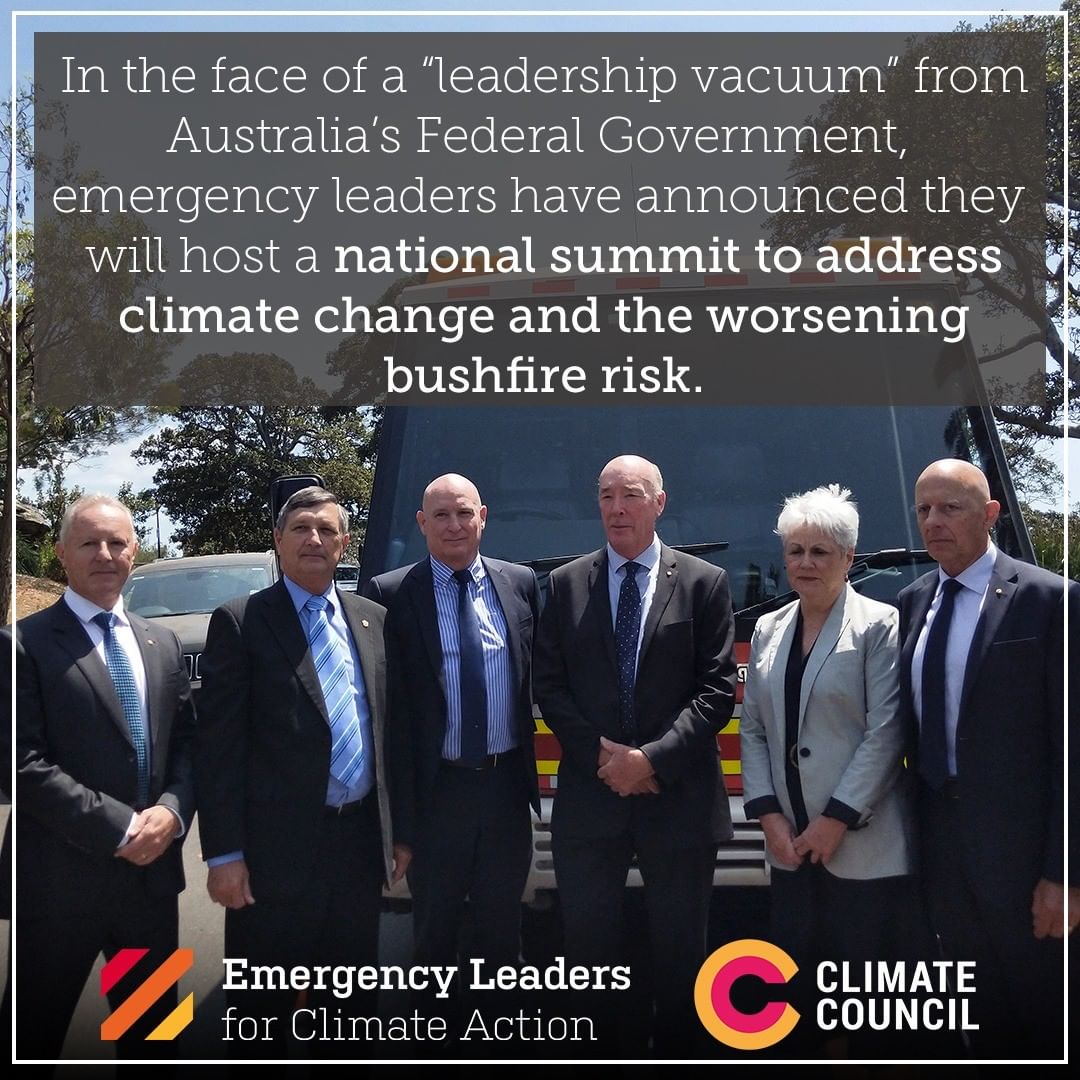Australia’s Black Summer fires over 2019 and 2020 were unprecedented in scale and levels of destruction – and they were fuelled by climate change.
Fed up with the lack of leadership from our Federal Government throughout the bushfire crisis, and after several attempts to meet with the Prime Minister were ignored, the Emergency Leaders for Climate Action took matters into their own hands, and announced they were going to host Australia’s first virtual National Bushfire and Climate Summit.
The summit brought together hundreds of experts and community leaders from across Australia and the world, to formulate a set of recommendations to address the worsening risk of devastating bushfires fuelled by climate change.
Read the Emergency Leaders for Climate Action’s recommendations here!
As we recover from the unprecedented disaster of the recent bushfire season, and brace for the next, a coordinated national response is more important than ever to protect Australian communities.
Read on for a run-down of how the National Bushfire and Climate Summit 2020 came to be.
Who are the Emergency Leaders for Climate Action?
Emergency Leaders for Climate Action (ELCA) is a growing coalition of former senior Australian fire and emergency service leaders representing every fire service in Australia, and a number of SES and land management agencies. Throughout their careers, these leaders observed how the increasingly catastrophic extreme weather events that Australia is experiencing are putting lives, properties and livelihoods at greater risk and overwhelming our emergency services.
ELCA exists to catalyse all levels of government and community members to recognise increasing threats and to urgently act on climate change.
How is climate change affecting bushfires?
Climate change – caused by the burning of coal, oil and gas – is driving worsening bushfire conditions in Australia, by creating:
- Hotter temperatures: Australia is getting hotter, with more extreme hot days and longer, hotter heatwaves. These conditions are increasing the risk of bushfires in many areas.
- A longer fire season: Hotter conditions mean a longer fire season, leading to more dangerous bushfires and leaving less time for hazard reduction.
- Drier vegetation & ‘fuel’: Hotter conditions and periods of low rainfall dry out soil and vegetation, increasing fire risk.
- More lightning: A warmer climate increases the chance of lightning, which is a key factor in starting fires.
The hot, dry conditions that fuelled the 2019-2020 fires will continue to worsen without substantial, concerted action to rapidly phase out coal, oil and gas. Taking action against climate change now – which means reducing our greenhouse gas emissions ASAP – will provide a chance to stabilise, then eventually reduce disaster risks for future generations.
Got more questions about bushfires and climate change? Watch this video, check out this infographic, or read more in our Bushfire Info Hub!
Timeline of events leading to the National Bushfire and Climate Summit 2020
May 10, 2019: Emergency Leaders for Climate Action (ELCA) was formed
Back in early 2019, the Emergency Leaders for Climate Action wrote to the Federal Government about the escalating bushfire risk in Australia due to climate change. The letter alerted the Government to the threat of “increasingly catastrophic extreme weather events” and called on both major parties to recognise the need for “national fire fighting assets,” including large aircraft, to deal with the scale of the threat. ELCA launched a joint statement in The Australian and The Age Newspapers.
July 2019: Bushfire season starts early
Climate change is making bushfire seasons longer and more dangerous. The bushfire season started in winter in 2019, and was well established by early spring in NSW – far earlier than normal – following record heat and dryness and unprecedented fire weather danger.
Read more about the terrible summer here
December 17, 2019: ELCA announces Summit with the backing of the Climate Council community
The Emergency Leaders for Climate Action announced they will host a summit after the bushfire season ends, because of their “huge disappointment in the lack of national leadership during a bushfire crisis”. The announcement came as fires still raged across New South Wales and Western Australia. The summit was made possible by the Climate Council’s incredible community, who supported the event from beginning to end.

2019-2020 Black Summer bushfires
Australia’s Black Summer was unprecedented in scale and harm. The 2019-20 bushfire season was the worst on record for New South Wales in terms of its intensity, the area burned, and the number of properties lost. It was also the worst season on record for properties lost in Queensland.
Fuelled by climate change, 2019 was the hottest and driest year ever recorded, which resulted in fires that:
- Burned through land two-and-a-half times the size of Tasmania (more than 17 million hectares)
- Killed more than a billion animals
- Affected nearly 80 percent of Australians
- Took the lives of over 450 people from the fires and smoke
- Destroyed more than 3,000 homes and thousands of other buildings.
June 9, 2020: Summit launch
Due to COVID-19, the National Bushfire and Climate Summit 2020 pivoted from a face-to-face event, to a series of online virtual events and roundtables. The launch took place via a live streamed public panel, and featured experts across disaster preparedness, emergency services, climate science and defence. The panel was hosted by Greg Mullins and Australian journalist, Kerry O’Brien.
You can watch the highlights of the launch panel below, or the full panel here.
June – July 2020: Summit roundtables
Over June and July 2020, ELCA brought together leading climate scientists, former and current emergency leaders, Indigenous fire practitioners, doctors, veterinarians, farmers, community leaders, social service providers, economists, mayors, bushfire survivors, and many other members of the community for the National Bushfire and Climate Summit 2020. In a series of online roundtables, these experts formulated a set of 165 recommendations to address the worsening risk of extreme bushfires fueled by climate change.
Read the Emergency Leaders for Climate Action’s recommendations here!
July 29, 2020: National Bushfire and Climate Summit Wrap-Up event, and recommendations released
To summarise the discussions that took place at the National Bushfire and Climate Summit 2020, ELCA produced the Australian Bushfire and Climate Plan report. The report provides a broad plan and practical ideas for governments, fire and land management agencies and communities to help us mitigate and adapt to worsening fire conditions. It contains 165 recommendations, including many measures that can be implemented right now, to ensure communities are better protected. This plan is evidence-based, will help keep Australians as safe as possible from worsening bushfires, and empower communities to build resilience and lead recovery efforts.
What’s next?
While unprecedented, the Black Summer was not unforeseen. For decades climate scientists have warned of an increase in climate-related disasters, including longer and more dangerous bushfire seasons.
It is fundamental to dealing with the long-term escalation of disaster risks that Australia must do better to reduce global greenhouse gas emissions by moving beyond fossil fuels.
“We can’t fight fires unless we fight climate change.” – Greg Mullins, Former Commissioner Fire and Rescue NSW, and Climate Councillor
We hope the recommendations outlined in the Australian Bushfire and Climate Plan will be reflected in the final report of the Bushfire Royal Commission.
We are also taking out a full-page ad in the Australian newspaper to try and get this plan in front of as many people as possible.
Watch this space!
Read the Emergency Leaders for Climate Action’s recommendations here!
